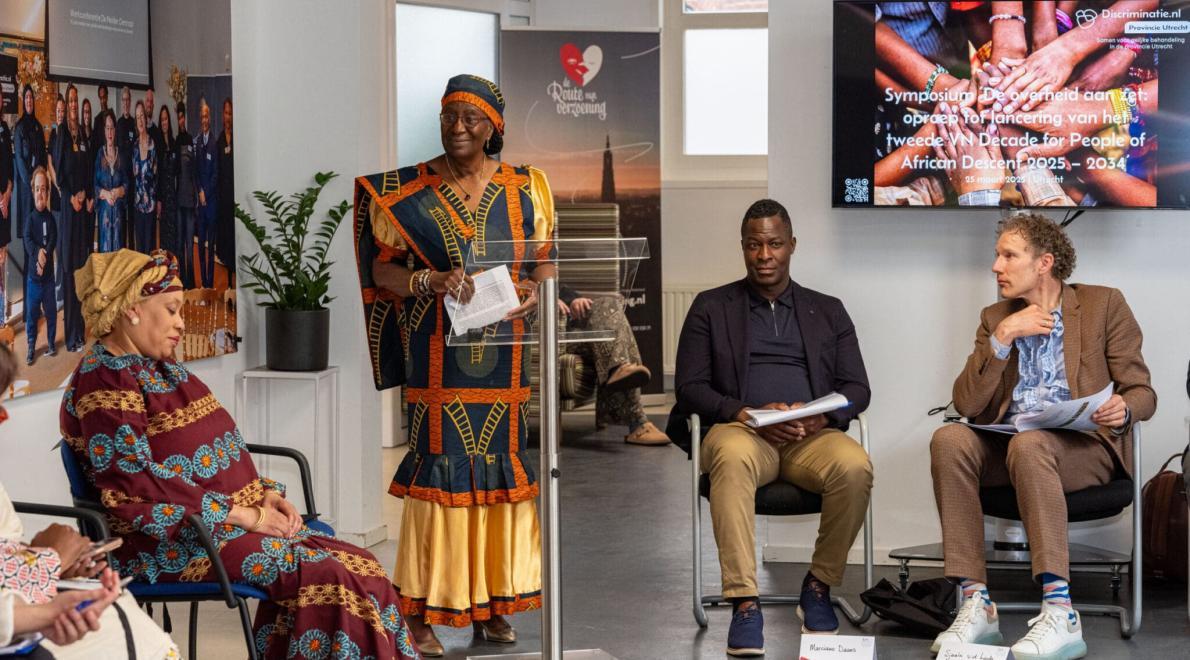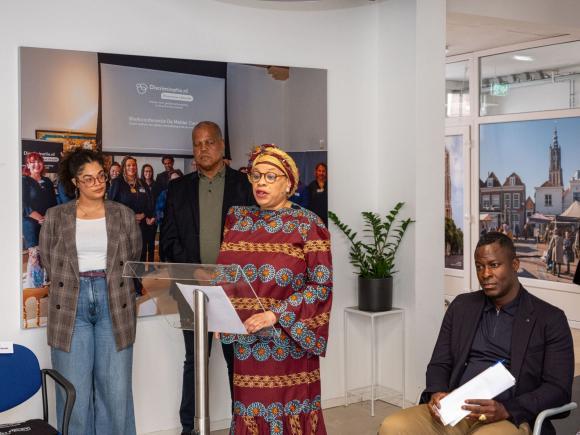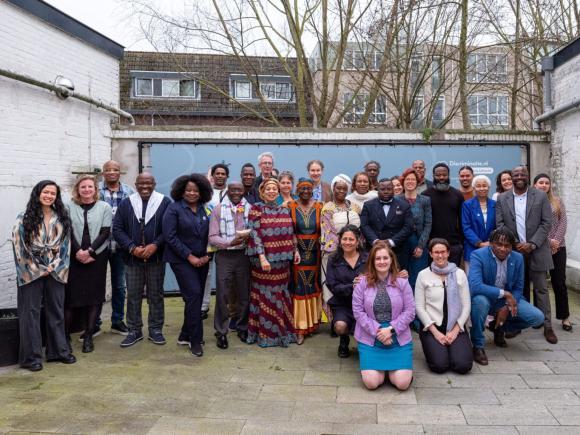Image



UTRECHT, Netherlands -- During the symposium ‘The Government Must Act’ in Utrecht, representatives of Afro-descendant communities, anti-discrimination organizations and the United Nations called on the Dutch government to take responsibility within the framework of the Second International UN Decade for People of African Descent (2025–2034). This global UN agenda was proclaimed on 17 December 2024 as a continuation of the first Decade (2015–2024), which, despite good intentions, yielded too few tangible results worldwide.
The message from the symposium was clear: The Netherlands must engage now – with actions, not just words.
What is the UN Decade for People of African Descent?
In 2013, the United Nations proclaimed 2015–2024 as the International Decade for People of African Descent, with three central goals: recognition, justice, and development. Member States, including the Netherlands, committed to the accompanying Programme of Activities aimed at tackling structural racism, addressing the injustices of slavery, and strengthening the position of people of African descent.
Yet in the Netherlands, substantial national efforts failed to materialize: there was no National Action Plan (NAP), no structural funding, and only limited institutional policies. Meanwhile, Afro-Dutch organizations actively contributed to UN reporting, formulated a 12- point plan, and organized events and knowledge-sharing initiatives, including an NGO NAP proposal.
The UN has therefore extended the Decade through the end of 2034 and is explicitly urging Member States to ensure structural implementation, with reparatory measures, data-driven policies, and collaboration with communities.
“The first Decade was largely symbolic. This Second Decade must become the Reparations Decade,” said Dr. Barryl Biekman, coordinator of the UN Decade in the Netherlands. “Reparations are not abstract. They require investment in education, the labor market, and representation. Concrete policies at both local and national levels. Restoration of trust and dignity.”
Ten Years of Policy Silence – Time for Action
Although the Netherlands issued an official apology in 2022 for its role in slavery, there is still no National Action Plan (NAP) to implement recognition, reparations, and structural change. This not only violates a moral responsibility but also deviates from the UN’s requirement for national implementation of the Decade’s Programme of Activities. The UN states that only with clear plans, political will, and structural resources can lasting impact be achieved.
“Recognition has been voiced, but action is still missing,” emphasized Dr. Mila Paspalanova, representing the UN Human Rights Office (OHCHR). “The Netherlands has the opportunity to lead. The people here today form a powerful coalition – they deserve to be heard and supported.”
A National Action Plan that delivers on recognition and justice must involve more than paper plans. It requires a fundamental shift in who gets to shape policy. That is why Afro-Dutch communities are calling for the active participation of Afro-professionals in the development, implementation, and monitoring of policy. Their expertise and lived experience are essential to prevent policy from remaining stuck in abstractions or well-meaning symbolism. Structural involvement of Afro-professionals – within ministries, advisory boards, oversight bodies, and implementing agencies – is essential to turn systemic injustice into lasting solutions. Only then can words like “recognition” and “reparations” take root in the practice of governance and justice. At the same time, it is vital that policymakers and government organizations invest in their own awareness. The evaluation of the first UN Decade emphasized that civil servants and administrators must be willing to engage in education about colonial legacies, institutional racism, and Afrophobia. Only a learning government can build equal partnerships with communities and develop truly inclusive policy.
The numbers are clear: Afrophobia is rising
The need for policy is urgent. During the symposium, three anti-discrimination services presented alarming figures from 2024:
Afrophobia refers to hostility, fear, aversion, or prejudice against people of African descent, their culture, physical traits (such as skin color and hair texture), or anything perceived as “African.” It is a specific form of racism deeply rooted in colonial history, the Transatlantic slave trade, and the accompanying dehumanization.
Dr. Barryl Biekman emphasized during the symposium that using the term Afrophobia is crucial: “Anti-Black racism is not the same as general racism. If we don’t acknowledge that, we remain stuck in abstractions. The term is important because it allows for targeted conversations about racism against people of African descent, rather than generalizing. Only when you name something, can you effectively fight it – in policy, education, and public awareness.”
Government must act – nationally and locally The symposium stressed that municipalities are not the problem: local governments like Utrecht, Amersfoort, Rotterdam, and Amsterdam are taking responsibility – often with limited resources. What is missing is national leadership. “We make policy with the community, not about them,” said alderwoman Linda Voortman on behalf of the city of Utrecht, which calls itself a “Human Rights City.” “That means supporting Black-led organizations, improving representation, and listening to stories that have long been ignored."

Concrete call: Cabinet, seize this opportunity
The organizations, Afro-community representatives, and UN delegates jointly formulated the following call to the Cabinet, Parliament, and government institutions:
Action Points for the Dutch Government
About the symposium
‘The Government Must Act’ took place on 25 March 2025, the International Day of Discriminatie.nl Provincie Utrecht | https://art1mn.nl | info@art1mn.nl 28 maart 2025 | Pressrelease 2 nd UN Decade People of African Descent | Call to Policy Makers Remembrance of the Victims of Slavery and the Transatlantic Slave Trade. The event was organized by Discriminatie.nl Province of Utrecht, in collaboration with regional offices in Amsterdam, Haaglanden, and Hollands Midden.
Speakers included: Dr. Barryl Biekman, Dr. Mila Paspalanova (OHCHR), Princes Modi Ntambwe, and alderwoman Linda Voortman (Utrecht). Panel participants: Jerry Afriyie, Captain Sylvester Aboikoni, Marciano Daans, and Sjaak van der Linden. The launch was spiritually guided by Basiya Ray Landveld.
Participating organizations:
African Union African Diaspora Sixth Region Council, De Hofnar Present, Discriminatie.nl Haaglanden en Hollands Midden, Discriminatie.nl Province of Utrecht, Discriminatie.nl Region Amsterdam, Municipality of Utrecht, Municipality of Amersfoort, National Platform for Slavery History, Marron Community, Nederland Wordt Beter, NINsee, PAD Belgium, Platform Sabi, SDGHUB NL, UN OHCHR, Vereniging Discriminatie.nl, Zwart Manifest.
